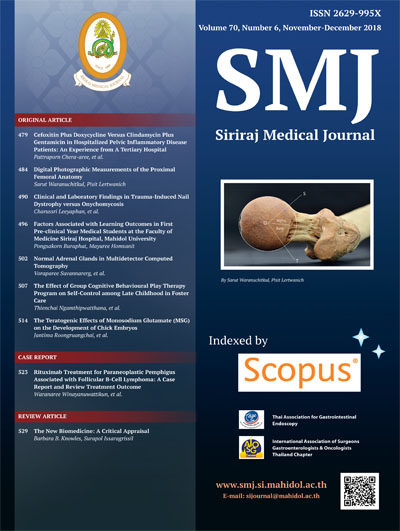The New Biomedicine: A Critical Appraisal
Keywords:
Biomedicine; critical appraisalAbstract
Mahidol University’s namesake, H.R.H. Prince Mahidol, stated the University’s universal view of higher education as follows: ‘True success is not in the learning, but in its application to the benefit of mankind’.1 It is thus fitting that the following commentary speaks to the University’s goal. The acquisition of basic scientific knowledge by scientists working in genetics, embryology, developmental biology, immunology and virology throughout the twentieth century led to its application to clinical problems in the twenty-first. The technology to repair geneticallydeficient
pluripotent stem cells, treating diseased adults or ensuring the birth of healthy babies now is almost within our power. However, the application of this knowledge to living organisms, using cells that can mutate and selectively evolve, makes clinical application tricky while social and ethical issues arising from the eventual use of these technologies requires thought. Future attention to trends in basic science research should make stem cell
therapy applicable to all.
Downloads
Published
How to Cite
Issue
Section
License
Authors who publish with this journal agree to the following conditions:
Copyright Transfer
In submitting a manuscript, the authors acknowledge that the work will become the copyrighted property of Siriraj Medical Journal upon publication.
License
Articles are licensed under a Creative Commons Attribution-NonCommercial-NoDerivatives 4.0 International License (CC BY-NC-ND 4.0). This license allows for the sharing of the work for non-commercial purposes with proper attribution to the authors and the journal. However, it does not permit modifications or the creation of derivative works.
Sharing and Access
Authors are encouraged to share their article on their personal or institutional websites and through other non-commercial platforms. Doing so can increase readership and citations.











